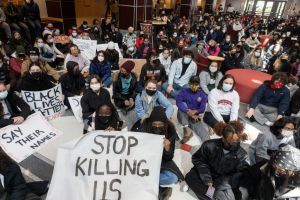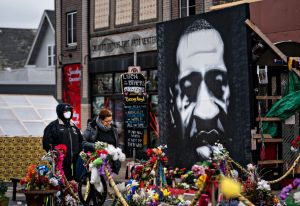We Must Reimagine Public Safety—Anything Less Fails Our Communities

Source: SOPA Images / Getty
March marked one year since Breonna Taylor came home one night, got into bed, and did not live to see the next day. That night, Breonna was killed by members of the Louisville Police Department; there has been no accountability for the officers who entered the wrong home and murdered a sleeping Black woman. And now, minutes before we saw jurors in Minnesota deliver a guilty verdict from an unredeemable and racist legal system for George Floyd’s murder, police shot and killed yet another Black person, Ma’Khia Bryant, a sixteen year-old child murdered within 22 seconds of police arriving on the scene.
We already know that the current criminal legal system will never deliver justice, broad accountability, or keep our communities safe. Our elected leaders clapped and cheered for accountability and quickly called it justice while pushing for legislation that doesn’t address the root causes of our pain. Recently passed by the House of Representatives, the Justice in Policing Act offers investments in the same police departments that are killing Black people and reforms that have failed time and time again to protect us. To honor the lives of Freddie Gray, Breonna Taylor, Ahmuad Arbery, Tony McDade, and so many more, we need to urgently rethink current approaches to public safety while enacting new laws that support Black people and protect our lives.
Ma’Khia’s murder is an enraging reminder that the Chauvin trial is one blip in the fight to keep our communities safe. George Floyd should still be here. Daunte Wright should still be here. Adam Toledo should be here. Ma’Khia Bryant should still be here. We say their names like a prayer that will somehow keep us going when we feel like we can’t move forward. Ma’Khia’s death was all the more painful because there is no space for us to breathe, to recover from one trauma before the next rolls over us in waves. The question we must ask ourselves is when is it enough?
Over the past four decades we’ve seen federal spending on police increase by over 350%, and a 500% increase in the number of people confined in jails and prisons — with Black people arrested, convicted, and facing significantly longer sentences than any other group. Rooted in anti-Black systemic racism, policing and mass incarceration represent a crisis for our communities, robbing us of loved ones and neighbors, draining critical public resources, and creating a more dangerous world for Black people.

Source: JEFF DEAN / Getty
Underlying this crisis is a dominant myth that the police keep us safe, even though centuries of state violence against Black bodies continually expose this lie. Police grew out of slave patrols: their job from the beginning was to treat Black people, and other oppressed communities, as property and criminals.
We know that there will be no justice in policing. There never has been.
Last year’s uprisings in defense of Black lives made it clear that we need to move away from ineffective reforms and implement real solutions to keep Black people safe. That’s why we drafted the BREATHE Act, historic civil rights legislation that will build a new model of public safety.
Rooted in the Vision for Black Lives, which was built through months of community-based engagement and policy development, the BREATHE Act will work to reduce the size, scope, and power of policing. BREATHE puts forward more effective ways of addressing community safety and directs resources to treatment and non-911 crisis response alongside numerous community investments. BREATHE creates economic justice by protecting labor standards and strengthening the rights of unions, while ensuring that its new job creation initiatives guarantee the right to unionize. Most importantly, BREATHE recognizes one core truth: that deaths from police violence don’t just reflect a bad technique, but a bad model.

Source: Jason Armond / Getty
The proposed reforms within the Justice in Policing Act, or JPA, have all been implemented before in cities and states across the country, and these reforms were not enough to prevent the police violence that adds up to over 1,000 people killed by the police every year. These ineffective and outdated reforms include the “no-knock” warrant ban that would not have saved Breonna Taylor’s life, as well as the chokehold ban that was in place in New York at the time Eric Garner was murdered.
While the BREATHE Act responds to the demands for justice and accountability from 26 million people in the streets last year, the Justice in Policing Act doubles down on failed approaches to police reform and does not meet the moment that made its passage possible.
We do not need another $1 billion directed to reforms that have been proven to fail. We are calling on policymakers to divest from policing and invest in our communities. History, and our very dangerous present, demand and require a different approach.
We are accountable to community leaders, people who are or have been incarcerated, families of victims and survivors, and many others who experience the harm of state violence every day. The BREATHE Act responds to the voices of people who are most essential: the community members closest to the problem. Now we’re calling on members of Congress to follow the lead of community advocates and meaningfully engage with the BREATHE Act, beginning by holding hearings in the House and Senate.
Congress must reject the Justice in Policing Act and redouble efforts to pass the BREATHE Act — because our response must match the scope of the real problem. It’s time to do away with failed reforms that only extend the harm of policing in our communities. It’s time to reimagine public safety and allow our people to finally breathe free.
Tiffany Flowers is a social, economic, and racial justice movement strategist currently serving as the Campaign Director of The Frontline. Previously, Tiffany served as the Organizing Director at United Food & Commercial Workers Union, Local 400 and was part of the team who built the BREATHE Act, the racial justice movement’s signature legislation for Black liberation.
SEE ALSO:
There Is No Country For Black Girls Like Ma’Khia Bryant
How To Support Black Youth In The Aftermath Of The Chauvin Verdict And Ma’Khia Bryant‘s Killing
















